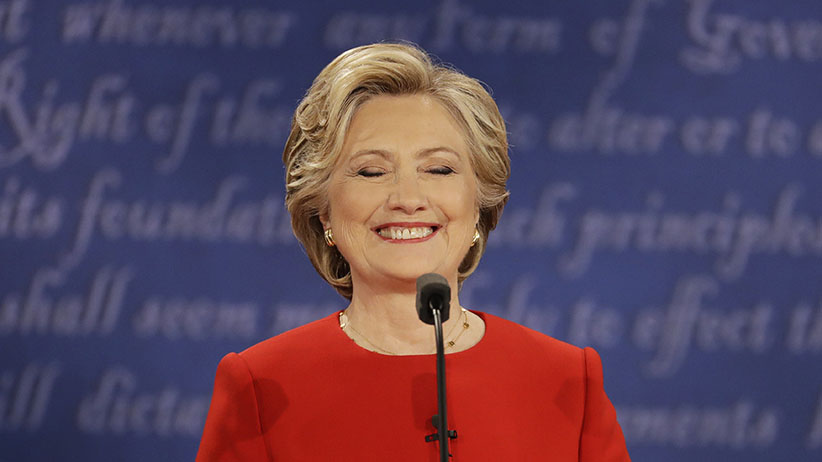The subversive debate smile of Hillary Clinton
Anne Kingston on why Clinton’s smile was a necessary accessory to a rhetorical and visual thrashing of Trump
Democratic presidential nominee Hillary Clinton listens to Republican presidential nominee Donald Trump during the presidential debate at Hofstra University in Hempstead, N.Y., Monday, Sept. 26, 2016. (AP Photo/Julio Cortez)
Share

At the first presidential debate of the 2016 U.S. election, Hillary Clinton did what women have been told for millennia to do: she smiled.
The Democratic nominee smiled pretty much non-stop through Monday’s debate with Donald Trump. Occasionally the beatific expression fixed on her face read a little like a ’50s housewife on “mother’s little helpers.” But it proved to be a necessary accessory to her relentlessly calm and unmerciful baiting of Trump, one not dissimilar to someone laying out peanut butter in a mousetrap to finish off a pesky rodent. “Donald thinks that climate change is a hoax perpetrated by the Chinese,” Clinton said at one point, referring to her opponent as if he were a young, errant boy. Trump, of course, bit: “I did not say that. I did not say that. I did not say that,” he responded, his irritation mounting, as Clinton calmly hit her talking points. (And yes, Trump did say that.)
As the debate—or rather the staged encounter featuring the Constitution of the United States etched in the background—unfolded, Clinton’s reasons to smile expanded. Her opponent sniffled and scowled and interrupted and downed water and raised his voice in a manner that was decidedly un-presidential. More damningly, Trump didn’t live up to his advance billing. He failed to humble Clinton, as so many of his supporters who wear “Kill the Bitch” T-shirts may have wanted. He failed to entertain. He wasn’t the disrupter; he was the disappointer.
For a few brief moments, Trump seemed to have traction on the topic of trade and Clinton’s emails, and then—pffft. Often his utterances were incomprehensible. One answer to a question about his call for Vladimir Putin to hack into American servers careened from discussion of the Russian president to imagining a 400-lb. hacker living in a basement to fighting ISIS to the talents of his 10-year old son. “I haven’t given a lot of thought to NATO,” the Republican presidential candidate admitted at one point. An answer involving Howard Stern and Sean Hannity will require a linguistics department to decipher. His recommendation that “China go into North Korea” no doubt sent shudders through the Pentagon. Then there were various cringe-making braggadocio pitches for a Trump hotel and a variety of organizations that endorsed him. The sundry other lies—not endorsing the war in Iraq, being unable to release his tax returns because he’s under audit, the previous mention of China and the climate change hoax—will be for a legion of fact-checkers to itemize.
MORE: Maclean’s aggregated the fact-checking—and measured it in Skittles
In hindsight, what is most surprising, and telling, about last night’s debate was how low expectations were for Clinton. Yet she was the candidate familiar with the debate format, familiar with policy and with doing her homework—all the qualities one seeks in a politician, debater, and elected official. Yet in the public eagerness to be shocked or amused or incited by Trump, all that somehow was forgotten—or dismissed.
It was the experienced Clinton, not the novice Trump, who would be the recipient of a deluge of unsolicited advice in the weeks, days and hours before the big event. Don’t cough. Train your eyes straight ahead lest those rumours of neurological problem persist. Don’t be a policy wonk. Don’t over-prepare. Avoid prepackaged zingers. Smile. Don’t lecture. “To beat Donald Trump in the U.S. presidential debates, Hillary Clinton must make him angry,” the Telegraph proclaimed. “66 things I am worried will go wrong for Hillary Clinton in the debates,” Slate fretted. “What can Hillary do to beat Trump?,” New York magazine asked. And then there was the august New Yorker: “Twelve debate questions that Hillary Clinton should be ready for.”
MORE: 100 minutes, two debates, and one ugly truth about America
What no one appeared to grasp is how the presidential debate format would, by definition, make Trump—defiantly neither a politician nor a policy wonk—angry. It was clearly a no-man’s land for him. There was no roaring approval from the crowd (although the edict was ignored at a few points). Clinton was the boss from the get-go. She came out of the gate talking gender—playing the grandmother card (it was her granddaughter’s birthday, she revealed) before launching into a discussion of the need for pay-equity and work-life balance. She spoke to people where they lived. She instructed Lester Holt to “turn back the clock” when Trump jumped in on her time. She mocked the fact that Trump had not done his homework: “And you know what else I prepared for?” she told him. “I prepared to be president, and I think that’s a good thing.” At another point Clinton said that “words matter”—even if this election cycle has proven that to be less true than ever before.
But spectacle does matter, more than ever. And on Monday, that spectacle saw Hillary Clinton smile and Donald Trump scowl. It’s a first, if not final, step in upending an instruction used for centuries to ensure women never had power. Who would have ever thought it could be so subversive?